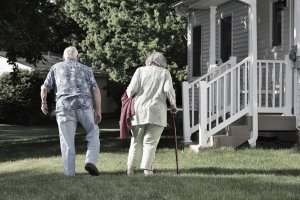Addressing Alcoholism in an Ageing Population-Increased Age, Increased Risk
Addressing Alcoholism in an Ageing Population
Alcoholism Risk by Dr. Gerard M. DiLeo, MD, CLCP:
By the year 2050, it is projected that the aging population of people over 60 will more than double, to over 2 billion worldwide, rising to 22% of the global population. We are living in a time where access to healthcare continually improves and medical science expands—now doubling every 73 days (as opposed to every 50 years in 1950). Simply, as lifespan increases and science progresses, people are living longer. Yet, while this “fountain of youth” has blessed many seniors with more years, it has also magnified the risks that all persons, regardless of age, experience. Alcoholism is one of these risks.
Increased Age Makes for Increased Danger
In a study it was found that 50% of adults over 65 consume alcohol. Of these, one of seven drink more than the recommended weekly allowance of 1 drink per day. We are all designed to age—our bodies, our organs, even our very cells. In spite of the increase in life expectancy, alcohol exposure may not be met with the same resistance to damage that we were able to muster when younger. Alcohol abuse, targeting specifically the liver, kidneys, brain, and immune system, may accelerate this aging (that is, dysfunction) of organs. Not only does damage occur faster, but it is further aggravated by the accumulation of total alcohol history over time; and the longer one lives, the more alcohol history can build up.
Thus, a faster aging of organs due to alcohol abuse can increase other secondary dangers, such as depression, dementia, falls, and infections, any of which can become life-threatening. One example is the added decline in response-time alcohol adds to driving, additive to the already-decreased response time for elderly drivers.
Withdrawal, a life-threatening challenge even to younger people, will see the elderly have less resilience and less of a chance of surviving it.
Increased Age Increases the Risk Factors for Alcoholism
The risk factors for alcoholism in the elderly are more common in younger persons:
- Depression from the inevitable solitude and isolation that comes with less mobility, decreasing social involvement, and transportation issues.
- Anxiety as one moves from a life of capability to one of incapacity.
- Pain from aging problems, such as arthritis.
- Disability that can increase as one gets older.
- Helplessness (physically, socially, or financially) to improve one’s quality of life.
- Bereavement over the loss of loved ones.
Alcohol has traditionally been the “tonic” for these classical risk factors, often increasing alcohol abuse due to this “go-to” remedy which increases in proportion to how persons may perceive these unwelcome developments.
How Does One Know He or She Is at Risk for Alcohol Abuse?
The American Geriatrics Society has been instrumental in developing simple ways to judge whether alcohol consumption is becoming a problem. A concerned love one can use them but, even better, one can ask him- or herself these “CAGE” questions:
- Have you or others ever felt that you should Cut down on your drinking?
- Have you become Annoyed by people complaining about how much you drink or how you act after drinking?
- Have you ever felt Guilt, regret, or simply bad about how much you drink, what you did, how you acted, or how you treated others while drinking?
- Do you need a drink as an “Eye-opener” first thing each morning, to prepare you for your day, calm your nerves, or even “treat” a hangover?
Do You Pass or Flunk This Simple Test?
If one answers YES to any one of these questions, there is a problem, and because of age, it is a worse problem than in younger persons. It indicates that help is not only indicated, but probably an emergency. Thankfully, help is readily available.
Our Friday Song of the Week-Woodstock -With a Little Help from My Friends
Our Friday Song of the Week – Woodstock – With a Little Help from My Friends
After seeing Santana in Charlotte my wife and I were inspired to have a Woodstock party. Not taking my duties lately, I found the Woodstock lineup and all the songs that were performed. I took it upon myself to try to learn at least one or two songs from each artist at Woodstock in the order of appearance. Some artists or songs were so obscure that I had to skip them or I simply did not know the songs. For some artists I didn’t care for the songs that they did at Woodstock so I did another one of their songs that they made famous after Woodstock. I figured it was only appropriate to rehearse in my garage and to tape the rehearsal as opposed to going into my more polished studio and hooking up everything to my sound system on my computer. So what you’re seeking and hearing is my replication of our version of Woodstock complete with the garage band feel, me in jeans and a T-shirt and unshaven. Please pardon the surroundings, but I thought it would add some authenticity, but I hope you enjoy the songs. So here’s one by Richie Haven, the opening act. He did two Beatle’s covers. This one is A Little Help from My Friends. It’s the sanitized version as I could not find a backing track that matched his arraignment.
Our Friday Song of the Week – Nice and Easy
Our Friday Song of the Week – Nice and Easy
Aging in Place – Charlotte Today – Podcast
 Aging in Place – Charlotte Today
Aging in Place – Charlotte Today
AGING IN PLACE. SURE, easy to do – no sweat, right? Just live in your home forever. Well, the reality is that there’s more to it than meets the eye. Aging in place is a decision-making process. We explore more on Charlotte Today. After consulting with family and experts – like certified aging in place specialists – you may decide you can retrofit your home and safely stay there. However, you have options. And it doesn’t mean a direct trip to assisted living. At the end of the day, be one of the people who don’t have to say “I never thought about that.” Think about it now.
Podcast: Play in new window | Download
Subscribe: Apple Podcasts | RSS
Our Friday Song of the Week – Cheek to Cheek
Our Friday Song of the Week – Cheek to Cheek










